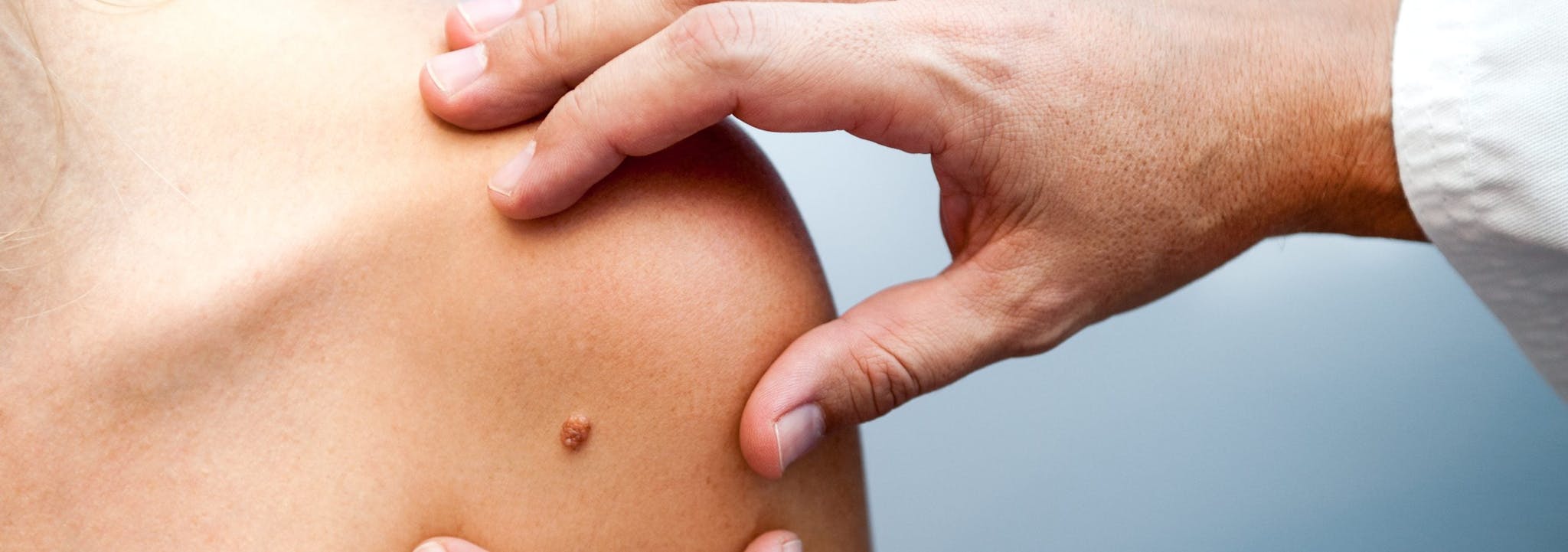Skin cancer, a disease in which skin cells grow abnormally, is among some of the most commonly diagnosed types of cancer. Skin cancer is often caused by exposure to the sun and ultraviolet (UV) radiation, but there are also other kinds of skin cancer.
Most cases of skin cancer are preventable with the right habits. Here’s a look at the different types of skin cancer, its causes and how you can prevent it.
Types of Skin Cancer
Different types of skin cancer include:
- Basal and squamous cell skin cancer: These are cancers typically found in areas that see lots of sun exposure, including the head, neck and arms. They’re very common types of skin cancer, but there are several good treatment options.
- Melanoma: This is a less common type, with a higher likelihood of spreading to other areas in the body.
- Merkel cell skin cancer: This is a form of carcinoma in which particular cells called “Merkel cells” grow uncontrollably and quickly.
- Lymphoma: This is a cancer that begins in the immune system, or in rare cases, in the lymphomas themselves.
- Kaposi sarcoma: A cancer developed in the lymph nodes or blood vessels that can cause lesions in soft tissues.
Causes of Skin Cancer
Skin cancer starts in the epidermis, the skin’s top layer that protects skin cells. The epidermis is where basal and squamous cells exist, as well as melanocytes—the cells that produce melanin and give skin its color. Mutations of these cells can cause cancer. UV rays are often a large contributor to the development of skin cancer, but there are other things that can increase your risk.
Risk Factors
Factors that can increase your risk of skin cancer include:
- Sun exposure: Extreme exposure to the sun, including tanning lamps or beds, will increase your risk of skin cancer.
- Sunburn history: If you’ve had at least one blistering sunburn as a child or a teenager, your risk of skin cancer in adulthood goes up.
- Fair skin: People with less melanin in the skin have reduced protection from UV rays, and are at a higher risk for skin cancer.
- Moles: A mole condition called dysplastic nevi, which includes abnormal moles that are more likely to become cancerous, can increase your risk.
- History: A family or personal history of skin cancer also increases your risk.
- • Immune system: Whether due to other conditions or genetics, people with weakened immune systems are more susceptible.
- Skin lesions: Skin lesions called actinic keratoses can increase risk.
- Exposure: Exposure to certain substances, such as radiation or arsenic, can increase risk.
Prevention
Most cases of skin cancer can be prevented with the right lifestyle habits. These include:
- Sun protection: No matter what time of year it is or how strongly you think the sun is shining, protect yourself at all times. Wear sunscreen with an SPF of at least 15 any time you may be exposed to the sun, and reapply often while in the sun. In addition to sunscreen, wear protective clothing—sunscreen can’t protect you from 100-percent of the harmful UV rays, so make sure your skin is covered during long periods of exposure. Wide-brimmed hats, long-sleeved shirts and tightly-woven materials are good options. Some people even use photoreceptive clothing, which your doctor can recommend if you’re interested.
- Avoidance: During the middle of the day while the sun is at its strongest, simply avoiding long periods of exposure is the best tactic to avoid increasing your risk. Clouds offer much less protection than you think, so keep that in mind as well.
- No tanning beds: Tanning in the natural sun should be limited as well, but tanning beds should be avoided altogether. Their UV rays increase the risk of skin cancer.
- Medications: Certain antibiotics and other over-the-counter medications can make skin more sensitive to sunlight. Ask your doctor if any of your medications are sun-sensitizing.
- Regular checks: Especially if you’re at higher risk for skin cancer, regularly checking your skin and reporting back to your doctor can help avoid cases of skin cancer. Check for new growths or moles, or changes in existing ones.
Speak to your doctor to learn more about skin cancer causes and prevention.
As Utah County’s leading dermatology practice, Revere Health Dermatology provides the best in skin care for our patients.
Sources:
“Skin Cancer.” American Cancer Society. https://www.cancer.org/cancer/skin-cancer.html
“Skin Cancer (Including Melanoma)-Patient Version.” National Cancer Institute. https://www.cancer.gov/types/skin
“Skin cancer.” The Mayo Clinic. http://www.mayoclinic.org/diseases-conditions/skin-cancer/basics/definition/con-20031606






